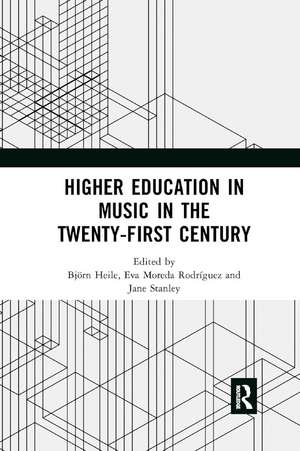Higher Education in Music in the Twenty-First Century
Editat de Björn Heile, Eva Moreda Rodriguez, Jane Stanleyen Limba Engleză Paperback – 12 dec 2019
The authors, Music academics from the University of Glasgow, provide case studies from their own extensive experience, which are complemented by an Afterword from Nicholas Cook, 1684 Professor of Music at the University of Cambridge. Together, they examine what students can and should learn about and from music and what skills and knowledge music graduates could or should possess in order to operate successfully in professional and public life. Coupled with these considerations are reflections on music’s social function and universities’ role in public life, concluding with the co
Preț: 259.10 lei
Preț vechi: 310.96 lei
-17% Nou
Puncte Express: 389
Preț estimativ în valută:
49.58€ • 51.90$ • 41.02£
49.58€ • 51.90$ • 41.02£
Carte tipărită la comandă
Livrare economică 05-19 aprilie
Preluare comenzi: 021 569.72.76
Specificații
ISBN-13: 9780367881351
ISBN-10: 0367881357
Pagini: 224
Dimensiuni: 156 x 234 x 31 mm
Greutate: 0.41 kg
Ediția:1
Editura: Taylor & Francis
Colecția Routledge
Locul publicării:Oxford, United Kingdom
ISBN-10: 0367881357
Pagini: 224
Dimensiuni: 156 x 234 x 31 mm
Greutate: 0.41 kg
Ediția:1
Editura: Taylor & Francis
Colecția Routledge
Locul publicării:Oxford, United Kingdom
Cuprins
Introduction Björn Heile, with Eva Moreda Rodriguez 1. Should There Be a 21st century ‘Complete Kapellmeister’? The Skills, Content and Purposes of a University Music Degree John Butt 2. The Learning Community, a Quodlibet Martin Parker-Dixon 3. Integrative Music History: Rethinking Music since 1900 Björn Heile 4. The Many Voices of ‘Art Song’ David Code 5. The Music Industries: Theory, Practice and Vocations – a Polemical Intervention Martin Cloonan and John Williamson 6. Writing about Music in the 21st Century Eva Moreda Rodriguez 7. Assessing Making and Doing Nick Fells 8. The Teaching of Creative Practice within Higher Music Education: Guerrilla Learning Objectives (GLOs) and the Importance of Negotiation Louise Harris and David McGuinness 9. On Teaching Composition: Why it Can Be Taught and Why that Matters Bill Sweeney 10. A Reflective Dialogue on Teaching Composition Drew Hammond and Jane Stanley
Notă biografică
Bjorn Heile is Professor of Music (post-1900) at the University of Glasgow.
Eva Moreda Rodriguez is Lecturer in Music at the University of Glasgow, having completed her PhD at Royal Holloway College in 2010.
Jane Stanley is an Australian-born composer and Senior Lecturer in Music at the University of Glasgow.
Eva Moreda Rodriguez is Lecturer in Music at the University of Glasgow, having completed her PhD at Royal Holloway College in 2010.
Jane Stanley is an Australian-born composer and Senior Lecturer in Music at the University of Glasgow.
Descriere
Today’s music students encounter a greater diversity of musical traditions and critical approaches to their study as well as a wider set of skills than their forebears. These developments come at a price. More material cannot be added to the curriculum without either sacrificing depth for breadth or making much of it optional. The dangers of bot
